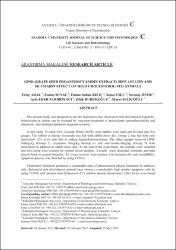| dc.contributor.author | Aral, Erinç | |
| dc.contributor.author | Sunal, Emine | |
| dc.contributor.author | Kılıç, Fatma Sultan | |
| dc.contributor.author | Uslu, Sema | |
| dc.contributor.author | Öner, Setenay | |
| dc.contributor.author | Eker Sariboyaci, Ayla | |
| dc.contributor.author | Burukoğlu, Dilek | |
| dc.contributor.author | Kılıçoğlu, Murat | |
| dc.date.accessioned | 2015-02-24T09:46:00Z | |
| dc.date.available | 2015-02-24T09:46:00Z | |
| dc.date.issued | 2012 | |
| dc.identifier.issn | 21460264 | |
| dc.identifier.issn | 21460213 | |
| dc.identifier.uri | https://hdl.handle.net/11421/1523 | |
| dc.description.abstract | The present study was designed to test the hypothesis that cholesterol rich diet-induced hypercholesterolemia in rabbits can be reversed by long-term treatment of antioxidants (proanthocyanidin and silymarin) and antihyperlipidemic drug(simvastatin).
In this study 35 adult New Zealand White (NZW) male rabbits were used and divided into five groups. The rabbits in Group 1(control) was fed with rabbit chow diet. Group 2 was fed with only cholesterol (2% w/w) rich diet to induce hypercholesterolemia. The other groups received GPSE 100mg/kg (Group 3), silymarin 10mg/kg (Group 4) and simvastatin10mg/kg (Group 5) with cholesterol in addition to rabbit chow diet. At the end of the experiment, the animals were sacrified and their aorta were excised for intimal lesion analysis. Vessells were dissected, trimmed, and then placed fixed in neutral formalin. All tissue sections were stained with hematoxylin and eosin(H&E). Apoptotic process was detected by using TUNEL.
Cholesterol treatment produced a sustainable state of atheromatous plaque formation In addition, only cholesterol rich diet-induced animals have shown a considerably high number apoptotic cells by using TUNEL and plasma total cholesterol (TC) and low density lipoprotein (LDL) levels were found to be significantly high in this group (p<0.05). But simvastatin was significantly effective on the decreased plasma lipid levels. Histomorphometric intimal lesion analysis of the aorta showed less atheromatous plaque formation in simvastatin, GPSE and silymarin groups, respectively. Relaxation responses were significantly decreased in cholesterol group, but simvastatin treatment and also antioxidants significantly increased ach responses to the control level.
Cholesterol rich diet-induced hypercholesterolemia in rabbits partially was reversed by adding antioxidants prolonging its use. In addition simvastatin modulated lipid profiles. | en_US |
| dc.description.abstract | Araştırmamızda kolesterolden zengin diyet ile beslenen tavşanlarda hiperkolesterolemi üzerine uzun süreli antioksidanların (üzüm çekirdeği ekstresi ve silymarin) ve antihiperlipidemik ilaçların (simvastatin) kullanımının etkisi incelenmiştir.
Araştırmamızda 35 adet yetişkin Yeni Zelanda türü erkek tavşan kullanılarak 5 grup oluşturuldu. Grup 1 kontrol grubu olup hayvanlar sadece tavşan yemi ile beslendi. Grup 2 kolesterolden zengin diyet ile beslendi. Diğer üç grup ise kolesterolden zengin diyetin yanısıra üzüm çekirdeği ekstre-si/proanthosiyanidin (100mg/kg-grup 3), silymarin (10mg/kg-grup 4) ve simvastatin (10mg/kg-grup 5) ile beslendi. Deney sonunda tüm hayvanlar anestezi altında sakrifiye edildi ve aortaları alınarak intiba lezyonları incelendi. Damarlar daha sonra çevresel dokulardan temizlenerek nötral formalinde fikse edildi. Kesitler hematoksilen ve eosin ile boyandı. Apoptoz ise TUNEL metodu ile belirlendi.
Kolesterol diyeti ile beslenen hayvanlarda, ateromatöz plak oluşumu çok sayıda TÜNEL pozitif hücrelerin yanısıra plazma total kolesterol miktarı ile LDL diğer gruplara oranla anlamlı olarak (p 0.05) yüksek bulundu. Simvastatin ise plazma lipid seviyelerini belirgin olarak azalttı. Aortaların intima lezyonlarının histomorfometrik analizlerinde ise ateramatöz plaklar etki sırasına göre simvastatin, üzüm çekirdeği ekstresi, silymarin gruplarında azalmıştı Gevşeme yanıtları ise kolesterol grubunda en az, simvastatin ve antioksidan gruplarında artmış olup kontrol grubu değerlerine yakındı.
Sonuç olarak kolesterolden zengin diyetle beslenen tavşanlardaki hiperkolesterolemi uzun süre antioksidan kullanımı ile kısmen önlenmiştir. Simvastatin ise lipid profillerini düzenlemiştir. | en_US |
| dc.language.iso | eng | en_US |
| dc.publisher | Anadolu Üniversitesi | en_US |
| dc.rights | info:eu-repo/semantics/openAccess | en_US |
| dc.subject | Atherosclerosis | en_US |
| dc.subject | Grape Seed Extract | en_US |
| dc.subject | Proanthocyanidin | en_US |
| dc.subject | Simvastatin | en_US |
| dc.subject | Silymarin | en_US |
| dc.subject | Ateroskleroz | en_US |
| dc.subject | Üzüm Çekirdeği Ekstresi | en_US |
| dc.subject | Simvastatin | en_US |
| dc.subject | Silymarin | en_US |
| dc.title | Gpse (Grape Seed Proanthocyanidin Extract) Simvastatin and Silymarin Effect on High Cholesterol-Fed Animals | en_US |
| dc.title.alternative | Yüksek Kolesterol Diyeti ile Beslenen Hayvanlarda Üzüm Çekirdeği Ekstresi (Proanthosiyanidin), Simvastatin ve Silymarinin Etkisi | en_US |
| dc.type | article | en_US |
| dc.relation.journal | Anadolu Üniversitesi Bilim ve Teknoloji Dergisi C - Yaşam Bilimleri ve Teknoloji | en_US |
| dc.relation.publicationcategory | Makale - Ulusal Hakemli Dergi - Kategorisiz | en_US |


















